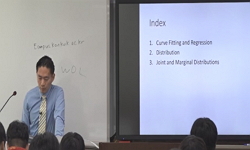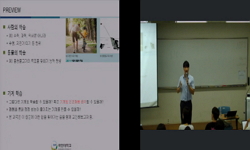Accurate electric load forecasting is very important in the efficient operation of the smart grid. Recently, due to the development of IT technology, many works for constructing accurate forecasting models have been developed based on big data process...
http://chineseinput.net/에서 pinyin(병음)방식으로 중국어를 변환할 수 있습니다.
변환된 중국어를 복사하여 사용하시면 됩니다.
- 中文 을 입력하시려면 zhongwen을 입력하시고 space를누르시면됩니다.
- 北京 을 입력하시려면 beijing을 입력하시고 space를 누르시면 됩니다.

효과적인 결측치 보완을 통한 다층 퍼셉트론 기반의전력수요 예측 기법 = A Multilayer Perceptron-Based Electric Load Forecasting Scheme via Effective Recovering Missing Data
한글로보기https://www.riss.kr/link?id=A106058868
- 저자
- 발행기관
- 학술지명
- 권호사항
-
발행연도
2019
-
작성언어
Korean
- 주제어
-
등재정보
KCI등재
-
자료형태
학술저널
-
수록면
67-78(12쪽)
-
KCI 피인용횟수
1
- DOI식별코드
- 제공처
-
0
상세조회 -
0
다운로드
부가정보
다국어 초록 (Multilingual Abstract)
Accurate electric load forecasting is very important in the efficient operation of the smart grid. Recently, due to the development of IT technology, many works for constructing accurate forecasting models have been developed based on big data processing using artificial intelligence techniques. These forecasting models usually utilize external factors such as temperature, humidity and historical electric load as independent variables. However, due to diverse internal and external factors, historical electrical load contains many missing data, which makes it very difficult to construct an accurate forecasting model. To solve this problem, in this paper, we propose a random forest-based missing data recovery scheme and construct an electric load forecasting model based on multilayer perceptron using the estimated values of missing data and external factors. We demonstrate the performance of our proposed scheme via various experiments.
국문 초록 (Abstract)
정확한 전력수요 예측은 스마트 그리드의 효율적인 운영에 있어 매우 중요하다. 최근 IT 기술이 획기적으로 발전되면서, 인공지능 기법을 이용한 빅 데이터 처리를 기반으로 정확한 전력수...
정확한 전력수요 예측은 스마트 그리드의 효율적인 운영에 있어 매우 중요하다. 최근 IT 기술이 획기적으로 발전되면서, 인공지능 기법을 이용한 빅 데이터 처리를 기반으로 정확한 전력수요를 예측하는 많은 연구가 진행되고 있다. 이러한 예측 모델은 주로 외부 요인과 과거 전력수요를 독립 변수로 사용한다. 하지만, 다양한 내부적 또는 외부적 원인으로 전력수요 데이터의 결측치가 발생하게 되면 정확한 예측 모델을 구성하기가 어렵다. 이에 본 논문에서는 랜덤 포레스트 기반의 결측치 데이터 보완 기법을 제안하고, 보완된 데이터를 기반으로 한 다층 퍼셉트론 기반의 전력수요 예측 모델을 구성한다. 다양한 실험을 통해 제안된 기법의 예측 성능을 입증한다.
참고문헌 (Reference)
1 김경환, "하절기 평일의 인공신경망을 이용한 24시간 전력수요 예측 알고리즘" 한국조명.전기설비학회 31 (31): 113-119, 2017
2 문지훈, "인공 신경망과 지지 벡터 회귀분석을 이용한 대학 캠퍼스 건물의 전력 사용량 예측 기법" 한국정보처리학회 5 (5): 293-302, 2016
3 박진웅, "인공 신경망 기반의 고시간 해상도를 갖는 전력수요 예측기법" 한국정보처리학회 6 (6): 527-536, 2017
4 J. Niu, "Twin support vector regression with Huber loss" 32 (32): 4247-4258, 2017
5 M. W. Ahmad, "Trees vs Neurons: Comparison between random forest and ANN for high-resolution prediction of building energy consumption" 147 : 77-89, 2017
6 M. Abadi, "Tensorflow: a system for large-scale machine learning" 16 : 265-283, 2016
7 H. Chitsaz, "Short-term electricity load forecasting of building in microgrids" 99 : 50-60, 2015
8 W. Kong, "Short-Term Residential Load Forecasting based on LSTM Recurrent Neural Network" 1-11, 2017
9 F. Pedregosa, "Scikit-learn: Machine learning in Python" 12 : 2825-2830, 2011
10 F. Tang, "Random forest missing data algorithms" 10 (10): 363-377, 2017
1 김경환, "하절기 평일의 인공신경망을 이용한 24시간 전력수요 예측 알고리즘" 한국조명.전기설비학회 31 (31): 113-119, 2017
2 문지훈, "인공 신경망과 지지 벡터 회귀분석을 이용한 대학 캠퍼스 건물의 전력 사용량 예측 기법" 한국정보처리학회 5 (5): 293-302, 2016
3 박진웅, "인공 신경망 기반의 고시간 해상도를 갖는 전력수요 예측기법" 한국정보처리학회 6 (6): 527-536, 2017
4 J. Niu, "Twin support vector regression with Huber loss" 32 (32): 4247-4258, 2017
5 M. W. Ahmad, "Trees vs Neurons: Comparison between random forest and ANN for high-resolution prediction of building energy consumption" 147 : 77-89, 2017
6 M. Abadi, "Tensorflow: a system for large-scale machine learning" 16 : 265-283, 2016
7 H. Chitsaz, "Short-term electricity load forecasting of building in microgrids" 99 : 50-60, 2015
8 W. Kong, "Short-Term Residential Load Forecasting based on LSTM Recurrent Neural Network" 1-11, 2017
9 F. Pedregosa, "Scikit-learn: Machine learning in Python" 12 : 2825-2830, 2011
10 F. Tang, "Random forest missing data algorithms" 10 (10): 363-377, 2017
11 T. Hong, "Probabilistic electric load forecasting:A tutorial review" 32 (32): 914-938, 2016
12 A. Gerossier, "Probabilistic Day-Ahead Forecasting of Household Electricity Demand" 2017 (2017): 2500-2504, 2017
13 G. Dudek, "Pattern-based local linear regression models for short-term load forecasting" 130 : 139-147, 2016
14 W. -W. Kim, "Operation Strategy of Multi-Energy Storage System for Ancillary Services" 32 (32): 4409-4417, 2017
15 X. Ke, "Load Profile Analysis and Short-term Building Load Forecast for a University Campus" 1-5, 2016
16 G. Hinton, "Lecture 6aoverview of mini-batch gradient descent"
17 S. Jurado, "Hybrid methodologies for electricity load forecasting: Entropy-based feature selection with machine learning and soft computing techniques" 86 : 276-291, 2015
18 T. M. Oshiro, "How Many Trees in a Random Forest?" Springer 154-168, 2012
19 T. Niet, "Hedging the risk of increased emissions in long term energy planning" 16 : 1-12, 2017
20 R. K. Jain, "Forecasting energy consumption of multi-family residential buildings using support vector regression: Investigating the impact of temporal and spatial monitoring granularity on performance accuracy" 123 : 168-178, 2014
21 L. Ghelardoni, "Energy Load Forecasting Using Empirical Mode Decomposition and Support Vector Regression" 4 (4): 549-556, 2013
22 K. Grolinger, "Energy Forecasting for Event Venues: Big Data and Prediction Accuracy" 112 : 222-233, 2016
23 M. R. Sarkar, "Electricity Demand Forecasting of Rajshahi City in Bangladesh Using Fuzzy Linear Regression Model" 1-3, 2015
24 A. Bagnasco, "Electrical consumption forecasting in hospital facilities : An application case" 103 : 261-270, 2015
25 W. Lee, "Development of 24-hour Optimal Scheduling Algorithm for Energy Storage System using Load Forecasting and Renewable Energy Forecasting" 1-5, 2017
26 주성관, "Demand-Side Management Program Planning Using Stochastic Load Forecasting with Extreme Value Theory" 대한전기학회 11 (11): 1093-1099, 2016
27 A. Dedinec, "Deep belief network based electricity load forecasting: An analysis of Macedonian case" 115 : 1688-1700, 2016
28 S. Ryu, "Deep Neural Network Based Demand Side Short Term Load Forecasting" 10 (10): 1-20, 2017
29 G. Panchal, "Behaviour Analysis of Multilayer Perceptrons with Multiple Hidden Neurons and Hidden Layers" 3 (3): 332-337, 2011
30 S. S. Reddy, "Bat algorithm-based back propagation approach for short-term load forecasting considering weather factors" 100 (100): 1297-1303, 2018
31 M. Abdel-Nasser, "Accurate photovoltaic power forecasting models using deep LSTM-RNN" 1-14, 2017
32 N. Zeng, "A switching delayed PSO optimized extreme learning machine for short-term load forecasting" 240 : 175-182, 2017
33 C. Fan, "A short-term building cooling load prediction method using deep learning algorithms" 195 : 222-233, 2017
34 M. Q. Raza, "A review on artificial intelligence based load demand forecasting techniques for smart grid and buildings" 50 : 1352-1372, 2015
35 A. S. Ahmad, "A review on applications of ANN and SVM for building electrical energy consumption forecasting" 33 : 102-109, 2014
36 B. Yildiz, "A review and analysis of regression and machine learning models on commercial building electricity load forecasting" 73 : 1104-1122, 2017
37 B. Zhang, "A multiple time series-based recurrent neural network for short-term load forecasting" 22 (22): 4099-4112, 2018
38 L. Hernandez, "A Survey on Electric Power Demand Forecasting: Future Trends in Smart Grids, Microgrids and Smart Buildings" 16 (16): 1460-1495, 2014
39 J. Moon, "A Short-Term Electric Load Forecasting Scheme Using 2-Stage Predictive Analytics" 219-226, 2018
40 A. Almalaq, "A Review of Deep Learning Methods Applied on Load Forecasting" 511-516, 2017
41 P.-H. Kuo, "A High Precision Artificial Neural Networks Model for Short-Term Energy Load Forecasting" 11 (11): 1-13, 2018
42 S. Park, "A Comparison of Various Machine Learning Techniques for Missing Values Recovering in Load Prediction" 1-2, 2018
동일학술지(권/호) 다른 논문
-
- 한국정보처리학회
- Khulan Setgelkhuu
- 2019
- KCI등재
-
구형물체의 중심좌표를 이용한 VLP-16 라이다 센서와비전 카메라 사이의 보정
- 한국정보처리학회
- 이주환
- 2019
- KCI등재
-
- 한국정보처리학회
- 송명호
- 2019
- KCI등재
-
깊이 영상 기반 필터를 적용한 효과적인 호모그래피 추정 방법
- 한국정보처리학회
- 주용준
- 2019
- KCI등재
분석정보
인용정보 인용지수 설명보기
학술지 이력
| 연월일 | 이력구분 | 이력상세 | 등재구분 |
|---|---|---|---|
| 2027 | 평가예정 | 재인증평가 신청대상 (재인증) | |
| 2021-01-01 | 평가 | 등재학술지 유지 (재인증) |  |
| 2018-01-01 | 평가 | 등재학술지 유지 (등재유지) |  |
| 2015-01-01 | 평가 | 등재학술지 유지 (계속평가) |  |
| 2012-10-31 | 학술지명변경 | 한글명 : 소프트웨어 및 데이터 공학 -> 정보처리학회논문지. 소프트웨어 및 데이터 공학 |  |
| 2012-10-10 | 학술지명변경 | 한글명 : 정보처리학회논문지B -> 소프트웨어 및 데이터 공학외국어명 : The KIPS Transactions : Part B -> KIPS Transactions on Software and Data Engineering |  |
| 2010-01-01 | 평가 | 등재학술지 유지 (등재유지) |  |
| 2008-01-01 | 평가 | 등재학술지 유지 (등재유지) |  |
| 2006-01-01 | 평가 | 등재학술지 유지 (등재유지) |  |
| 2003-01-01 | 평가 | 등재학술지 선정 (등재후보2차) |  |
| 2002-01-01 | 평가 | 등재후보 1차 PASS (등재후보1차) |  |
| 2000-07-01 | 평가 | 등재후보학술지 선정 (신규평가) |  |
학술지 인용정보
| 기준연도 | WOS-KCI 통합IF(2년) | KCIF(2년) | KCIF(3년) |
|---|---|---|---|
| 2016 | 0.35 | 0.35 | 0.28 |
| KCIF(4년) | KCIF(5년) | 중심성지수(3년) | 즉시성지수 |
| 0.23 | 0.19 | 0.511 | 0.06 |





 ScienceON
ScienceON KISS
KISS






